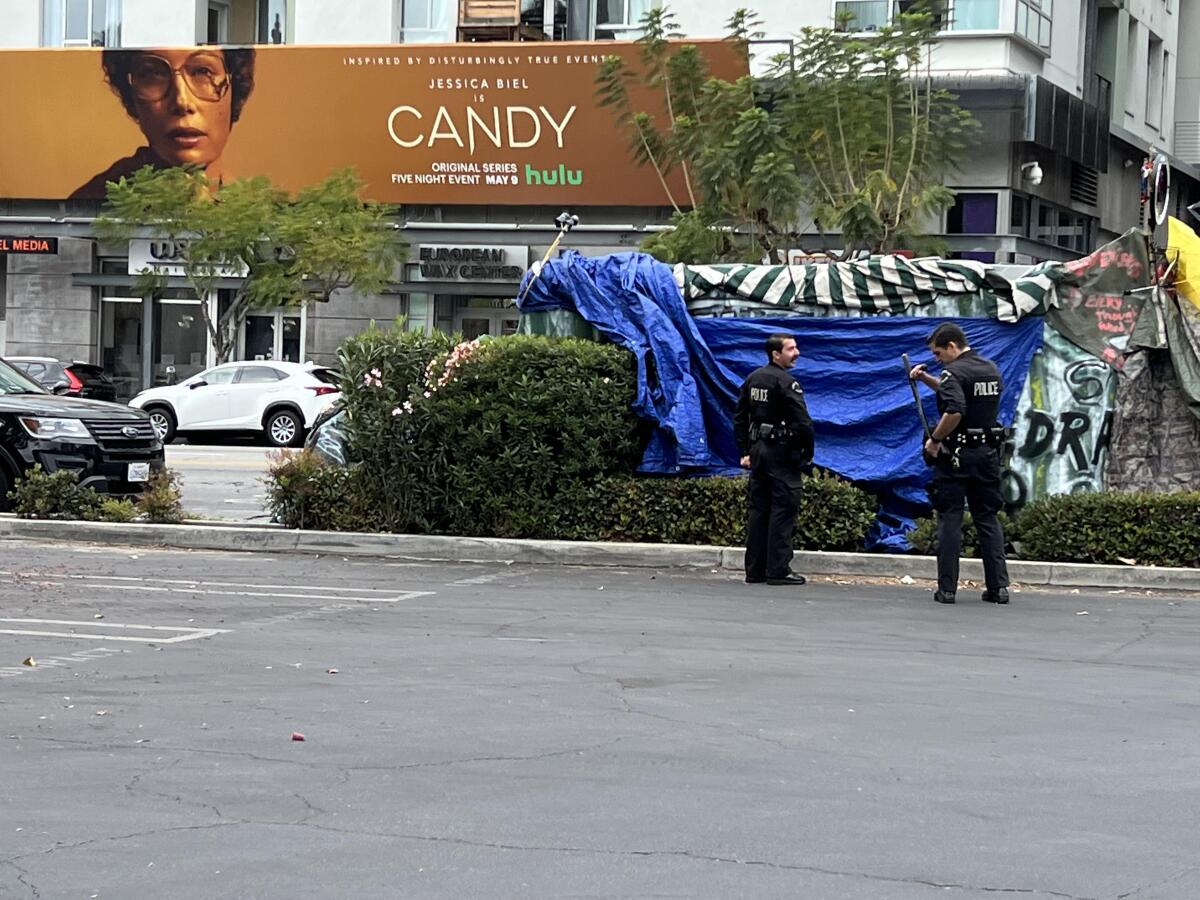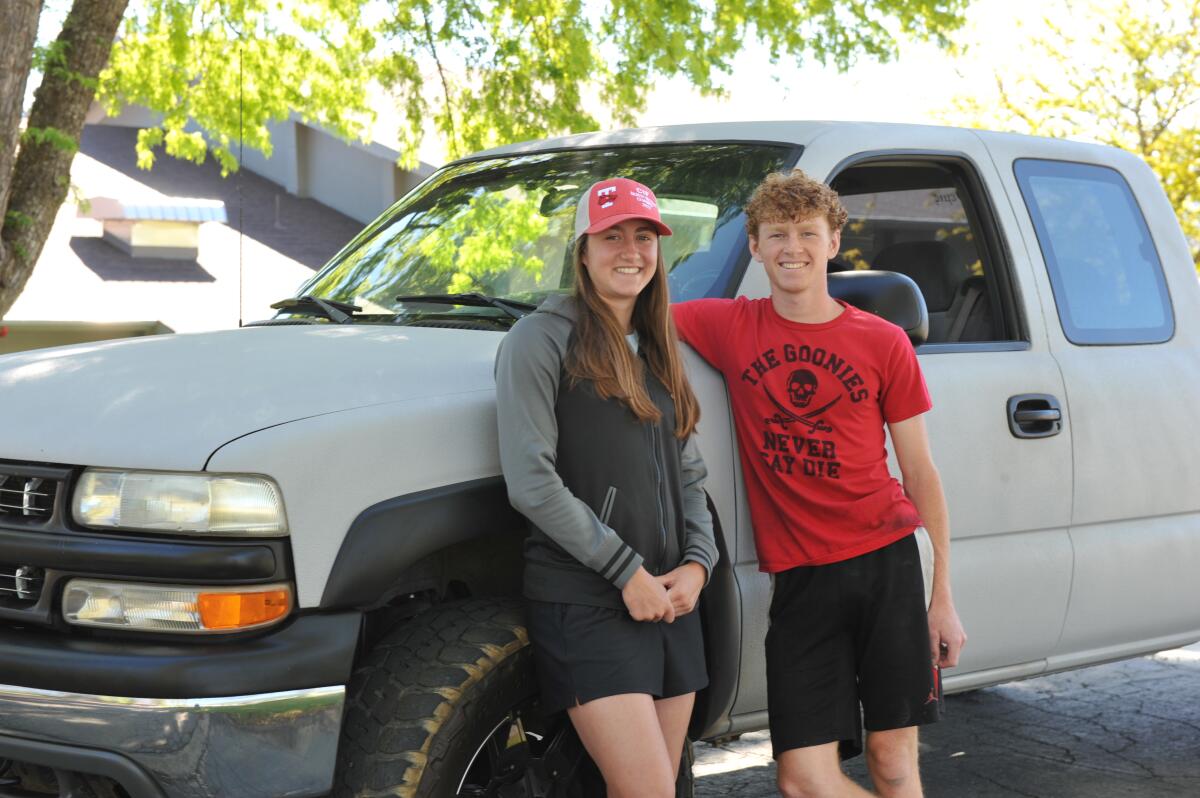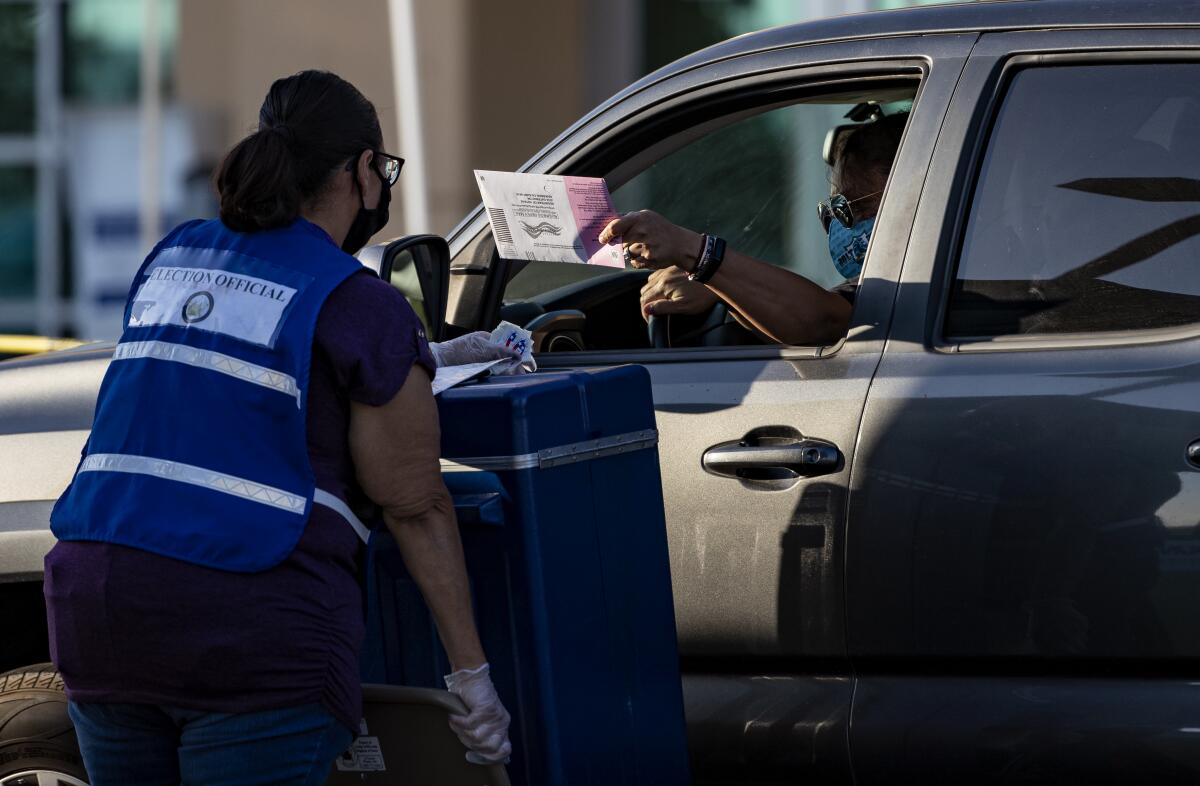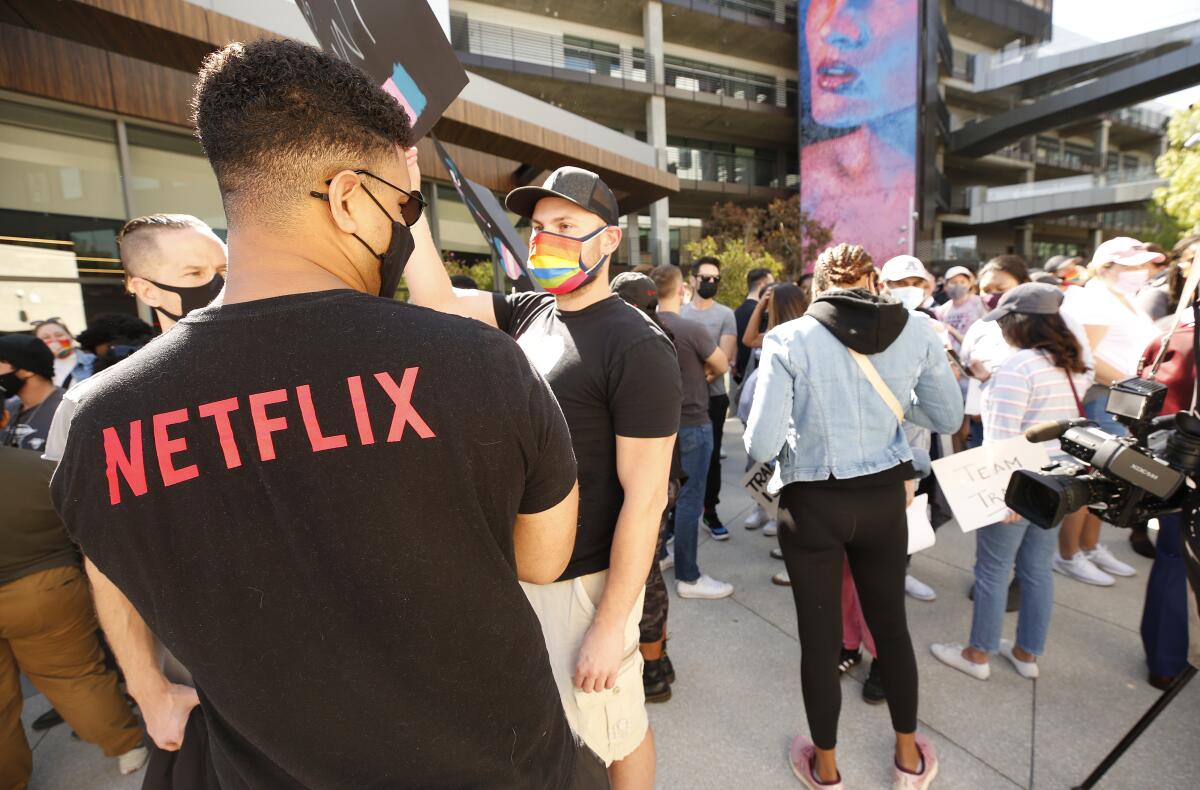California has billions. Why is homelessness still a problem?

- Share via
Good morning, and welcome to the Essential California newsletter. It’s Tuesday, May 31. I’m Justin Ray.
By now, you have probably heard that California has a lot of cash.
The state government’s surplus is expected to balloon to $97.5 billion by next summer under the budget plan recently unveiled by Gov. Gavin Newsom. “No other state in American history has ever experienced a surplus as large as this,” Newsom said at a news conference.
This month, Newsom unveiled his latest record spending proposal for the coming fiscal year. About half of the surplus is required by law to be allocated for education. But that still leaves about $49 billion on the table. The governor’s budget proposal asks lawmakers to devote the money to an array of causes like inflation relief, the drought and healthcare.
When I hear about the mountains of money California has, I wonder why solving homelessness remains so elusive. Many people on social media had the same reaction to the surplus. I have weighed this question as I have learned about the millions being spent in the L.A. mayoral campaign, in which many candidates have claimed they can reduce the homeless population in the city. Could that money be spent on doing just that?
‘The core of the chronic homeless problem’
The first thing to understand is that some of the money in the surplus is indeed being spent on homelessness. Newsom announced he was adding $700 million atop his originally proposed $2 billion in January to support housing solutions like tiny homes and encampment cleanups. That sum joins the $12 billion announced last year.
Secondly, experts told me that funding is an important factor but not the only one impeding the state from once and for all ending homelessness.
“I actually don’t believe that money is our most important challenge at this point. This is a systems failure. There is not nearly enough collaboration between neighboring governments,” Darrell Steinberg, the mayor of Sacramento, told me.
Steinberg specifically highlighted the issue that a lot of the work California does to help unhoused people is voluntary. He pointed to other services that the government is required to provide.
“It is not optional… to provide a free public education to kids. And it’s not optional to build public schools,” Steinberg said. “There is no mandate to produce housing. There is no right to housing for the individual who wants to be housed and can’t find housing and or shelter. There is no right to mental health treatment. Maybe that’s the core of the chronic homeless problem.”
He added, “When something is voluntary or optional, the performance is not nearly as good as [when it is] required.”
It is also important to acknowledge that many cities in the state have passed or proposed laws that would outlaw camping in certain areas, or increased the number of sweeps of encampments. “L.A. and Oakland passed laws meant to prohibit camping in certain zones; San Francisco’s mayor has pushed for a police crackdown on unhoused people using drugs in the Tenderloin neighborhood; Fresno adopted a law to fine people up to $250 for entering certain restricted areas,” the Guardian reported.
But Steinberg says California’s efforts are not all failure, highlighting that the state has managed to get tens of thousands of people off the streets. According to a news release from Gov. Gavin Newsom, state programs to end homelessness, such as Roomkey and Homekey, have created temporary shelter for 50,000 people and helped an additional 8,000 to secure more permanent housing.
Gov. Newsom’s housing advisor Jason Elliott acknowledged that the surplus would make it seem as if homelessness should be in the rearview mirror. But it’s not that simple.
“Why can’t we fix the prison system? Why can’t we make California’s K-12 education system the best in the world? Why can’t we, once and for all, address drought and clean water and so on and so forth?” Elliott said. “I’m making a point which is to say the crises that we face are not limited to homelessness. Homelessness may be arguably the most visible or the most in your face or the most you interact with it most viscerally on a daily basis.”
Elliott says that what we see in California is “a product of five or six decades of policy choices,” and “one budget surplus cannot erase the decades of bad decisions.”
And now, here’s what’s happening across California:
Note: Some of the sites we link to may limit the number of stories you can access without subscribing.
These parts of California have the nation’s highest gas prices — and residents are reeling. Americans everywhere are feeling pain at the pump, with the average price for a gallon of gas surpassing $4 in all 50 states this month for the first time ever, according to the American Automobile Assn. But nowhere are prices more eye-popping than in rural California. Los Angeles Times

From ‘more cops’ to ‘defund’: Candidates for L.A. mayor differ on crime and policing. Here’s where the mayoral candidates stand on issues such as how big the LAPD should be, what steps should be taken to combat crime, and how they feel about Dist. Atty. George Gascón and L.A. County Sheriff Alex Villanueva. Los Angeles Times
House Speaker Nancy Pelosi’s husband, Paul Pelosi, was arrested in Napa County on charges of driving under the influence. Los Angeles Times
L.A. STORIES
L.A. strippers risk being assaulted, fight to unionize. Dancers at Star Garden Topless Dive Bar in North Hollywood say the people who are supposed to protect them — the club owners and security guards — have failed to do so. For the past 10 weeks, they have been picketing outside the establishment trying to discourage any customers from entering. In early May, they voted to unionize with Stripper’s United. KCRW
New report on shootings involving Eli Vera, a candidate for Los Angeles County Sheriff. “Vera has repeatedly claimed he had only been involved in five incidents — four where no one was hit, and one in which Vera killed a teenager in 1999,” writes reporter Cerise Castle. But records obtained by Knock LA show he has six shootings on his record. Knock LA
Our daily news podcast
If you’re a fan of this newsletter, you’ll love our daily podcast “The Times,” hosted every weekday by columnist Gustavo Arellano, along with reporters from across our newsroom. Go beyond the headlines. Download and listen on our App, subscribe on Apple Podcasts and follow on Spotify.
POLITICS AND GOVERNMENT
TV station KCRA released a documentary, “Seeking Refuge: Hope on Hold,” that explains the current status of immigration and how it’s impacting California. One notable point the segment makes is that there’s a difference in support people are willing to give based on where refugees were coming from. “Now we have a flood of Ukrainians, I’m getting calls from everybody, [who] wants to open their door,” a manager at a nonprofit for housing immigrants said. “It was different with Haitians. It was different for Latinos.” KCRA
Could someone win the L.A. mayor’s race outright in June? Here’s why that’s unlikely. If a candidate in the June primary receives more than 50% of the vote, they win and avoid the general election in November. Achieving that substantial share of the vote would be a difficult feat in a race in which nine candidates are still running — and 12 names remain on the ballot. (P.S.: I wanted to reshare this L.A. primary election guide that tells you how to vote, the latest news on city politics, and recommendations from The Times’ editorial board.) Los Angeles Times

CRIME, COURTS AND POLICING
A South Bay school district will pay five men $7.5 million in a sexual abuse case settlement. The men were sexually abused by their elementary school teacher in the late 1970s and early ’80s at Cinnabar Elementary School in San Jose. The teacher, Dennis Thomas, was convicted of four counts of lewd and lascivious behavior with a child under 14 in 1982. ABC 7
The Amber Heard-Johnny Depp trial has turned this ex-L.A. prosecutor into a YouTube star. Former deputy D.A. Emily D. Baker is one of a growing number of legal experts who are making their name not on traditional media outlets like Court TV but online. Los Angeles Times
Support our journalism
CALIFORNIA CULTURE
An autonomous vehicle startup based in Silicon Valley and China can no longer test vehicles in California. The state’s Department of Motor Vehicles has revoked the company’s license for “numerous” safety violations. A spokesperson for Pony.ai said the debacle was caused by concerns the DMV had over three of its safety drivers’ records. The Verge
After layoffs at Netflix, questions mount over diversity efforts. Netflix recently laid off 150 employees and dozens of contractors and part-time workers. Cuts affected social media teams, writers and editors who aimed to elevate diverse content and talent. Some of the laid-off workers are questioning whether diversity efforts will become part of the collateral damage. Los Angeles Times

Free online games
Get our free daily crossword puzzle, sudoku, word search and arcade games in our new game center at latimes.com/games.
CALIFORNIA ALMANAC
Los Angeles: Sunny 78 San Diego: Sunny 68 San Francisco: Sunny 67 San Jose: Sunny 82 Fresno: Sunny 89 Sacramento: Sunny 89
AND FINALLY
Today’s California memory is from Skylar Blue (P.S.: Here is more information about Bridgeville):
I moved to Bridgeville, Calif., from Chicago to be closer to my daughter while she attended HSU. The town had just sold on eBay and news reporters from all over the world descended on BridgeFest, the town’s yearly Martian fair. The townspeople were very kind to this inner-city mom. I now could never leave Humboldt County as I’d be leaving a part of my soul.
If you have a memory or story about the Golden State, share it with us. (Please keep your story to 100 words.)
Please let us know what we can do to make this newsletter more useful to you. Send comments to essentialcalifornia@latimes.com.
Sign up for Essential California
The most important California stories and recommendations in your inbox every morning.
You may occasionally receive promotional content from the Los Angeles Times.




